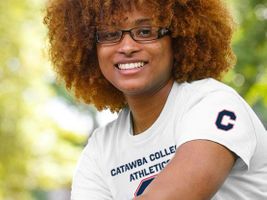Catawba College senior David Crescenzo recently completed a sustainability analysis of Maia Smith's downtown Salisbury business, Maia's Fashion. What he discovered in the process of his audit can translate into thousands of dollars in savings for this small business owner over the next five years.
Crescenzo of Jamestown is majoring in sustainability and community development. He completed his analysis during early January, accessing everything from the equipment Smith used in her business to its lighting, heating and air conditioning, water usage and plumbing, and waste management practices. He even suggested possible Utility Credits her business might qualify for.
Crescenzo
"Sustainability is about efficiency," Crescenzo explained. "A lot of the perception is that it's about being green, but the way I see it, it has to be good for the business first and then it can have the positive externality of being good for the environment.
"If a business can't profitably adopt something, then it has no reason to implement the change. A company will be more inclined to save a tree if it also makes them a dollar at the same time."
Crescenzo found that most of the equipment Smith uses in her business "is actually very efficient and is not in need of replacement." However, there are trade-in credits available for used sewing machines, which she could cash in at an area business, yielding annual savings due to the high frequency of replacement (about once a year).
Smith also has a tanning bed as part of her business and Crescenzo recommended she capitalize on its low operating costs and use it as an incentive. She could offer customers a coupon for a free tanning session if those customers purchase a skin care product she sells, he suggested.
He discovered that a significant annual savings of several hundred dollars could be realized in Smith's lighting infrastructure if she were to replace her bulbs with Fluorescent and/or LED bulbs. But, he noted that while "using a mix of fluorescent tubes and LED bulbs is actually the most efficient option, it requires more upfront investment and takes a little longer to pay for itself" one year, versus five months.
Smith
While he did not recommend replacing her heating and air-conditioning unit, Crescenzo encouraged Smith to "insulate your storefront around the entrance and display case window doors with simple products like weather/felt strips, an insulation snake, and/or a winter window insulation kit." These tactics, he said, "boast a 10-15% reduction in heating costs (about $10 a month)."
Crescenzo made no recommendations regarding Smith's water or waste usage. "Your company is already efficient in these categories due to their low use and I see no reason to change what you are doing," he explained in his analysis.
He found and shared with Smith three primary opportunities in North Carolina through which her business could receive Utility Rebates for implementing the change to more efficient lighting.
Smith told Crescenzo that she was going to implement most if not all of the recommendations he made and was very surprised at the amount of the savings she could realize annually.
"It's even more important for small businesses to make these types of assessments because they don't have lots of money to be throwing around. They need to run efficiently so they can grow and stay in business," Crescenzo concluded.
This hands-on experience has given Crescenzo much to ponder regarding his future career direction.
"It's really not my intention to start my own business right out of college, but it is very much on the radar," Crescenzo said with a smile. "Even if my own business starts out as a side job, it is definitely a practice I want to go into fulltime eventually.
"Part of the reality of that is I don't have enough experience to figure out all of the ins and outs – there's exposure that I still need to put forward the best product that I can – there are accreditations and experiences that I need to acquire before I can say that I am a full-fledged sustainability professional."
But if Crescenzo's work at Smith's business is any indication, he is well on his way toward becoming a sustainability entrepreneur.
